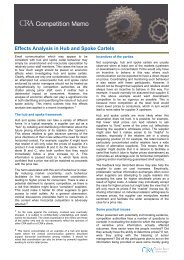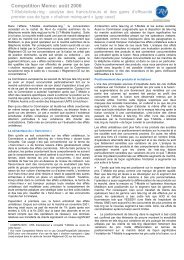CUSTOMER AGREED REMUNERATION - CRA International
CUSTOMER AGREED REMUNERATION - CRA International
CUSTOMER AGREED REMUNERATION - CRA International
Create successful ePaper yourself
Turn your PDF publications into a flip-book with our unique Google optimized e-Paper software.
REPORT BY <strong>CRA</strong> INTERNATIONAL<br />
4.2.2<br />
Even if CAR would not be valuable in its own right in the tied channel, theoretically it is<br />
possible that some form of disclosure may be necessary to prevent a regulatory failure<br />
i.e. the application of CAR in the IFA channel might encourage consumers to use other<br />
channels where advice is perceived to be free. However, such a regulatory failure is<br />
unlikely because:<br />
• It is relatively uncommon for consumers to shop around by comparing different<br />
advisers (around 10% of consumers); and<br />
• The group that considers both tied and independent advisers is a small minority of<br />
this group (less than 20% of those shopping around).<br />
One of the advantages of CAR is that consumers will be made aware that the cost of<br />
advice has implications for the price of the overall product i.e. that advice is not free.<br />
Despite negotiation over the cost of advice being unlikely in the short run in any channel,<br />
it seems unlikely that such a negotiation could arise in most tied intermediaries.<br />
Furthermore, the incentives faced by advisers in the tied channel are not directly related<br />
to the cost of advice that is, or would be, disclosed. Hence CAR would not, in itself,<br />
remove the potential for bias. Where advisers operate as a separate business with a<br />
single tie, advisers may face remuneration structures similar to those of IFAs and hence<br />
the disclosure of this remuneration would be related to the incentives faced by advisers.<br />
However, since these advisers only offer a single tie, there is limited ability for disclosure<br />
to reduce provider bias.<br />
Finally, in the interviews tied providers reported that it was difficult to differentiate<br />
between consumers on the basis of whether they wanted ongoing advice. This is because<br />
the reputation of the company as a provider is inherently linked to its behaviour as an<br />
adviser. In particular, tied providers indicated that reputational concerns would prevent<br />
them from refusing ongoing advice to a customer and therefore such ongoing advice<br />
needed to be included in the overall cost of the product and advice package. Thus there<br />
is reason to be sceptical that CAR can bring clarity to ongoing advice in the tied channel.<br />
We therefore do not recommend making it compulsory to use CAR in the tied channel.<br />
Instead, providers could be encouraged to ensure the incentives faced by tied advisers<br />
remove any potential for bias.<br />
Application to different types of product<br />
Again there is considerable agreement between intermediaries and consumers regarding<br />
the ordering of the types of products that CAR should be applied to, with investments and<br />
pensions widely supported and CAR considered less relevant for protection products<br />
(especially by intermediaries).<br />
38




